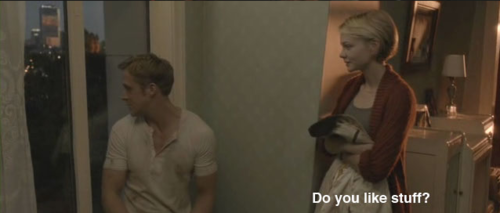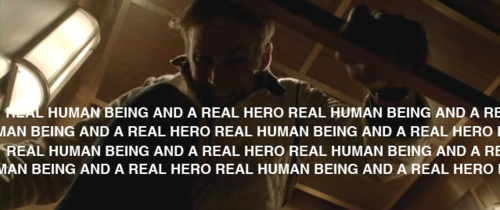This Year's Drive for Superficiality
As a filmgoer, I like to be surprised. Make that, pleasantly surprised. At this year’s Nightvision festival, I had limited time to go see any movies so I made the most of the situation by catching two movies back-to-back. The two films I ended up spending the evening with, The Guest and Nightcrawler, were both films that I knew very little about. I knew that they had both generally been well received and I had seen a picture or two from Nightcrawler but that was it. No hype. No loaded expectations. Just me and my movies. This experience of going into a cinema with little knowledge of what to expect? I relished it. Anyone that knows me even a little knows that I’m a spoilerphobe. I like to recommend movies by saying as little as possible about them which can be difficult. If you were to ask my opinion of either of the two films I saw at Nightvision, there would be at least one answer that I could give relating to both of them: they had a bit of an 80s vibe going on. Now stop. What did you just think of? What just popped into your head? More often than not, I’d expect that the follow-up response would be “Oh, like Drive?” Sigh… Therein lies the crux of this piece.
Remember Drive? That film with the awesome soundtrack? You know, the one where Ryan Gosling drives a car and is a total badass? Every single poster promoting Nightcrawler expects you to remember Drive. Each poster proudly informs us that, according to a critic from Empire magazine, Nightcrawler is “this year’s Drive!” Going back to The Guest, try and guess which movie it was compared to over and over again in the /Filmcast review? If you guessed Drive, give yourself a pat on the back (or a screwdriver to the face). One reviewer on the podcast, despite generally liking The Guest, kept comparing it unfavorably to Drive. You know? That movie where Ryan Gosling drives a car and is a total badass? That one with the bodacious soundtrack? People, we need to get up off Drive.
Getting to experience The Guest and Nightcrawler back to back definitely highlighted the fact that both films share some aesthetic similarities and both clearly seem to have been inspired by films from the past. Both films juxtapose dark areas with neon lights and both films feel like they exist in an era that isn’t quite ‘then’ yet isn’t quite ‘now’ either. You know what film was kind of similar to that? Drive. Yes, Drive had something of a similar aesthetic but why is it the film that all 80s-esque things are now held up to?
The Guest definitely has that 80s aesthetic vibe going for it. Like Drive, It’s also got a cool, handsome lead that’s something of a badass. Just like with that other film, the soundtrack is definitely worth mentioning too! However, I can’t say that I really thought about Drive much while watching it. If anything, The Guest feels like a modern film made by someone who binged on 80s movies. The characters and action beats feel like moments from a James Cameron movie of the past, with one moment in particular towards the end feeling like a straight up homage to a certain James Cameron movie (you’ll know it when you see it). In addition, certain bits of the style even reminded me briefly of a Kubrick film, with the title card popping up on screen as if it were from A Clockwork Orange. It is a film that appears to be very comfortable with what it is, and embraces that fully. It’s just pure fun, and it ends with one of my favorite final lines in quite some time.
Now. Let’s look at Nightcrawler or, as that one critic would like you to believe, “this year’s Drive.” Well, let me be the first to point out that “this year’s Drive” is actually very much not like Drive. Sure, on a purely superficial level it shares some aesthetic similarities, but the two films are otherwise pretty dissimilar. Gun to my head, one film that I would immediately compare Nightcrawler to would be Martin Scorsese’s Taxi Driver. Both films feature a man driving around a dark and seedy American city trying to make something of themselves. Both feature a morally ambiguous person who perhaps doesn’t quite understand society in general.
However, an even better film to compare Nightcrawler to would be the lesser known Martin Scorsese collaboration with Robert De Niro called The King of Comedy. This is a film about a socially awkward man with aspirations to be a successful stand-up comedian, with his ultimate goal being to perform on the late night talk show hosted by his hero. It’s a film about a person who seems to think that everything will work out if he’s just polite and does what he’s told. Be nice, behave, and the world will give you your dreams. Most of all, however, The King of Comedy is about loneliness and wanting to be accepted, which is something that it shares in spades with Nightcrawler.
There are two key scenes that demonstrate how lonely Louis Bloom, the main character of Nightcrawler played brilliantly by Jake Gyllenhaal, really is. The first is while watching a comedy on TV, he looks around his apartment before bursting forth in unnecessarily loud laughter, as if he’s sharing the joy with another person. The second is that throughout the movie, there are shots of him watering his plant, the only source of life in his apartment outside of himself. Louis is a heartbreakingly lonely man who really tries to do everything by the books, believing that it should guarantee success, and not understanding when it doesn’t. This theme is at the heart of Nightcrawler and it is at the heart of The King of Comedy but, in my opinion, it is certainly not at the heart of Drive.
Even the soundtrack of Nightcrawler has more in common with the bittersweet machinations of Trent Reznor’s soundtrack for The Social Network than it does with Drive’s admittedly pretty awesome selection of tracks. So why even make the comparisons to Drive? The line about it being “this year’s Drive” doesn’t even appear until the very end of the Empire review and it does so with no build-up whatsoever. So, that raises the question, what does it even mean? It’s a shallow and artificial way to say “remember that film that was cool to like? If you like this film, you’ll be cool too!” Ah yes, the relentless pursuit of the “cool” in our lives dictated by the faceless masses.
Now, don’t get me wrong. Drive is certainly not a bad movie. However, it’s been elevated to a status that I feel is hyperbolic. Yes, it was a film with a killer soundtrack. Yes, it had Ryan Gosling driving a car and being a complete and utter badass. Yet, at it’s core, I wonder whether there is much else to it. Not to say that a film needs to answer all of the deep questions in life (“which is better? Burger King or Hesburger?”) for it to be good but let’s not get ahead of ourselves and praise a film beyond what it is. At the end of the day, comparing these films to each other even does something of a disservice to them. The Guest is generally a pretty silly movie with some genuinely thrilling moments and I love it for that. It not only embraces that, but it knows how to have fun with it. without becoming overly overt. Nightcrawler is actually a rather brilliant film, with some generally well-thought out themes, but it also manages to be darkly comic and never superficially dramatic. Drive is a movie with a car, a strong, silent type, and an amazing soundtrack, and that’s all it is. And that’s fine. But Drive is not The Guest. Drive is certainly not Nightcrawler. And it’s definitely not the be-all, end-all, when it comes to the 80s aesthetic or films about people driving around in cars.



